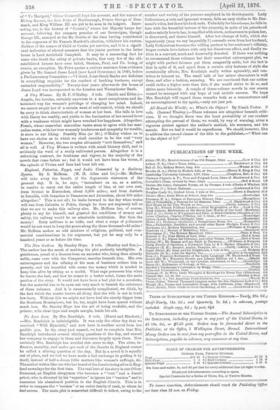No Love Lost. By Mrs. Randolph. 3 vols. (Hurst and
Blackett.) —Mrs. Randolph is indefatigable. It was only the other day that we received " Wild Hyacinth," and now here is another novel from her prolific pen. In the story just named, we had to complain that Mrs. Randolph introduced several stirring questions of the day, and caused her company to engage in them and discourse largely upon them. Now certainly Mrs. Randolph has avoided this error to-day. The aims, in- fluence, morality, and mocks operandi of the Jesuits in England cannot be called a stirring question of the day. But in a novel it is equally out of place, and we feel we have made a bad exchange in getting it by itself, instead of half-a-dozen little matters like woman's suffrage, ttc. The author writes like one who has heard of the Jesuits being alive in Eng- land nowadays for the first time. The real hero of the story is one Oliver Desmond, an English olergyman who becomes a "'vest " and a Jesuit priest, who is directed by his "superiors" to ignore his "'version" and to reassume his abandoned position in the English Church. This is in order to compass the "'version" of an entire family of rank, to whom he had access. The main plot is somewhat difficult to follow, owing to the i number and variety of the persons employed in its development. Lady Cotherstone, a vain and ignorant woman, falls an easy victim to Mr. Des- mond's wiles, but there his luck ends. Unluckily for his scheme, he falls in love with the beautiful heiress of the property, in spite of his priesthood makes unholy love to her, is repelled with scorn, endeavours to poison her, is discovered, and shoots himself. After her change of faith, which she ingeniously (may we say impossibly ?) conceals even from her husband, Lady Cotherstone becomes the willing partner in her confessor's villainy, I forges certain love-letters with only too disastrous effect, and finally re- tires to a convent, much and deservedly detested. If there was nothing to recommend these volumes but their somewhat extravagant plot, we might with perfect fairness put them summarily aside, but the fact is that in spite of it, and apart from a certain airy fastness of style she occasionally affects, Mrs. Randolph really writes agreeably, and con- trives to interest us. The small talk of her minor characters is well done, and after a fashion, amusing. We are convinced that our author could strike a higher note than this, if she would strive to do so, and strive more leisurely. A couple of three-volume novels in one season cannot be managed with any hope of real artistic success. We hope Mrs. Randolph will regard these remarks both as a remonstrance and an encouragement to try again,--only not just yet.






























 Previous page
Previous page